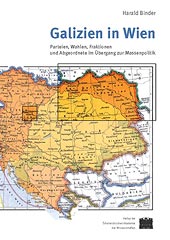

Diese Studie beschäftigt sich mit den politischen Beziehungen zwischen dem ehemaligen habsburgischen Kronland Galizien und der Reichshaupt- und Residenzstadt Wien vornehmlich in den letzten 20 Jahren der österreichisch-ungarischen Monarchie. Im Schnittpunkt der vier Teile des Buches stehen die Deputierten aus Galizien im cisleithanischen Abgeordnetenhaus, ihre über Parteien, Fraktionen und Wahlorganisationen verankerte institutionelle Rückbindung in der politischen Gesellschaft, ihre parlamentarische Tätigkeit und ihre kollektivbiographische Charakteristik. In chronologischer Hinsicht steht die Frage im Vordergrund, wie sich unter den Voraussetzungen eines vergleichsweise rückständigen Raumes der Übergang von einer von traditionalen Eliten im Rahmen eines Privilegien-Parlamentarismus bestimmten Politik hin zu einer Politik der Massen gestaltete. Dabei wird die sprengende Kraft der sozialen Bewegungen ebenso wie das reintegrative Potential des modernen Nationalismus thematisiert. Jenseits der für sich behandelten politischen Gesellschaften der Polen, Ruthenen (Ukrainer) und Juden wird insbesondere nach den übergreifend wirksamen Bedingungen und Handlungsmechanismen sowie den jeweiligen Wechselwirkungen gefragt, sei es im Bereich der Organisationsbildung, der Medien, der politischen Kultur oder der symbolischen Selbstdarstellung der kollektiven Akteure.
…
Focusing on the period from the late 19th century to the demise of the Habsburg Empire, this study analyses political relations between the crown-land of Galicia and the imperial capital, Vienna. The book is divided into four parts, the focus of which is provided by an examination of the lives and activities of the deputies from Galicia to the Austrian parliament.
The author investigates their collective biographies, and their integration into organized politics through political parties, parliamentary fractions and electoral committees. Special attention is devoted to the question as to how the shift from a traditional political society to a system of mass politics took place, in what was – comparatively speaking - a “backward” region. Besides analyzing these changing structures along the lines of the main national communities in Galicia (Poles, Ruthenians / Ukrainians, Jews), the author also seeks to identify the common conditions influencing all collective political action as well as the diverse forms of correlation and interaction between the national communities. All this is evidenced in the shaping of modern political organisations, the dynamic emergence of an age of mass media, the development of a specific regional political culture and at the symbolic level of self-representation.
2005
978-3-7001-3326-1
978-3-7001-3515-9
741 Seiten, 1 Plan,
24x17 cm, broschiert,